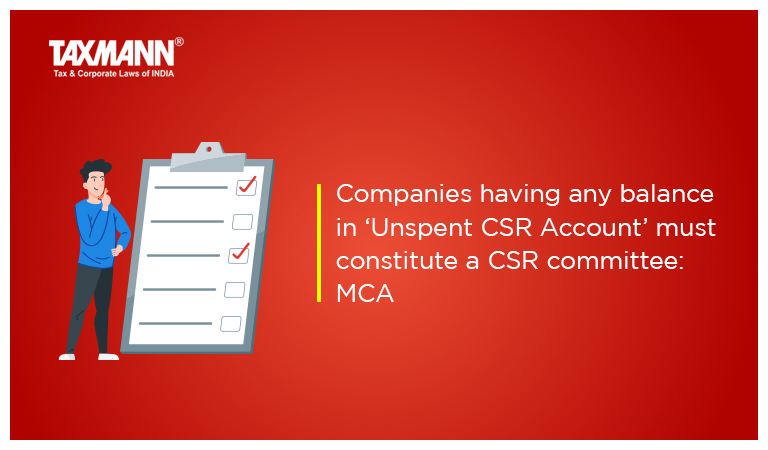Companies having any balance in ‘Unspent CSR Account’ must constitute a CSR committee: MCA
- Blog|News|Company Law|
- 3 Min Read
- By Taxmann
- |
- Last Updated on 23 September, 2022

Notification No. G.S.R. 715(E) DATED, 20-09-2022
The Govt. has notified the Companies (Corporate Social Responsibility Policy) Amendment Rules, 2022 to amend the Companies (Corporate Social Responsibility Policy) Rules, 2014. The amendments has been made in rule 3, 4 and 8 of the Companies (Corporate Social Responsibility Policy) Rules, 2014. Also, the format for the ‘annual report on CSR activities to be included in the board’s report’ has also been modified to make the disclosures more extensive.
The amendments brought in by the Companies (Corporate Social Responsibility Policy) Amendment Rules, 2022 are discussed herein below:
1. Companies having any amount lying in unspent CSR shall mandatorily constitute CSR Committee
A new proviso has been added in rule 3 of Companies (Corporate Social Responsibility Policy) Rules, 2014, which mandates that a company having any amount in its Unspent Corporate Social Responsibility Account shall constitute a CSR Committee.
2. Omission of rule 3 (2) to end the inconsistency of the rule with section 135 (9)
Section 135(9) and Rule 3(2) were contradictory in nature. The section talks about the non-constitution of the CSR committee where the CSR budget does not exceed Rs. 50 lakhs and pass on the responsibility of the CSR committee on the Board.
On the other hand, Rule 3 (2) talks about the conditions when the CSR committee constitution is not applicable and where it requires the company to check its applicability under sub-section (1) of section 135 for three consecutive preceding financial years.
At the time of the amendment of Section 135 (9) no respective changes were made in rule 3(2).
As rule 3 (2) was in contradiction of section 135 (9). Now the Ministry has omitted the rule 3(2) to align the rules with the section.
3. CSR activities can be undertaken through a registered public trust/registered society, exempted under section 10 of the Income Tax Act, 1961
The amendment has been made to rule 4, which deals with the implementation of CSR as per the amended norms CSR activities can also be undertaken through:
(a) Registered public trust or a registered society, exempted under sub-clauses (iv), (v), (vi) or (via) of clause (23C) of section 10 of the Income Tax Act, 1961 and which is established by the company, either singly or along with any other company.
(b) Registered public trust or a registered society, exempted under sub-clauses (iv), (v), (vi) or (via) of clause (23C) of section 10 of the Income Tax Act, 1961
and having an established track record of at least three years in undertaking similar activities.
Earlier, the companies were not allowed to undertake CSR activities through trusts/societies registered under section 10 of the Income Tax Act, 1961. Respective changes has been carried out in form CSR-1 also.
4. Reduction in the % of CSR expenditure that can be booked at the time of impact assessment.
As per rule 8
“A Company undertaking impact assessment may book the expenditure towards Corporate Social Responsibility for that financial year, which shall not exceed 5% of the total CSR expenditure for that financial year or 50 Lakh, whichever is less.”
Under the amended norms a company undertaking impact assessment may book the expenditure towards Corporate Social Responsibility for that financial year, which shall not exceed 2% of the total CSR expenditure for that financial year or 50 Lakh, whichever is higher.
5. Change in the reporting format of CSR disclosures to be made in the annual report
The format for the annual report on CSR activities to be included in the Board’s Report has been modified. Now the reporting has to be made in the updated format as notified.
Click Here To Read The Full Notification
Disclaimer: The content/information published on the website is only for general information of the user and shall not be construed as legal advice. While the Taxmann has exercised reasonable efforts to ensure the veracity of information/content published, Taxmann shall be under no liability in any manner whatsoever for incorrect information, if any.

Taxmann Publications has a dedicated in-house Research & Editorial Team. This team consists of a team of Chartered Accountants, Company Secretaries, and Lawyers. This team works under the guidance and supervision of editor-in-chief Mr Rakesh Bhargava.
The Research and Editorial Team is responsible for developing reliable and accurate content for the readers. The team follows the six-sigma approach to achieve the benchmark of zero error in its publications and research platforms. The team ensures that the following publication guidelines are thoroughly followed while developing the content:
- The statutory material is obtained only from the authorized and reliable sources
- All the latest developments in the judicial and legislative fields are covered
- Prepare the analytical write-ups on current, controversial, and important issues to help the readers to understand the concept and its implications
- Every content published by Taxmann is complete, accurate and lucid
- All evidence-based statements are supported with proper reference to Section, Circular No., Notification No. or citations
- The golden rules of grammar, style and consistency are thoroughly followed
- Font and size that’s easy to read and remain consistent across all imprint and digital publications are applied



 CA | CS | CMA
CA | CS | CMA
